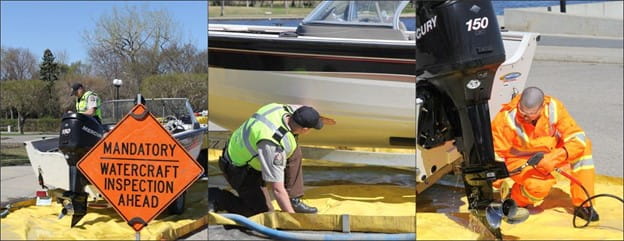Released on May 6, 2024
Join us in recognizing Saskatchewan Aquatic Invasive Species Awareness Week from May 6 to May 10 as the Government of Saskatchewan thanks the public for taking on their role in keeping aquatic invasive species (AIS) at bay.
AIS are plants, fish or diseases that have the potential to negatively impact the environment and can be unintentionally spread through recreational activities such as boating and fishing.
"Aquatic invasive species present a serious risk to Saskatchewan waters," Environment Minister Christine Tell said. "The public plays a critical role in helping slow the spread by using the clean, drain, dry technique, as well as submitting to watercraft inspections."
Clean, Drain, Dry
Following the Clean, Drain and Dry guidelines for watercraft, trailers and equipment after each use is the best way to prevent the spread of harmful AIS in Saskatchewan and ensures that these species are not transported or introduced to our waters. This includes kayaks, canoes and paddleboards.
Check out our Clean, Drain and Dry video.
Watercraft Inspection Program
Every summer, Saskatchewan runs the Watercraft Inspection Program. Watercraft inspection officers work at points throughout the province to inspect watercraft and equipment for AIS.

It is important to watch for watercraft inspection stations signs when traveling with watercraft through Saskatchewan. If you are transporting a watercraft and encounter an active inspection station, you MUST STOP - it is the law!
Watercraft inspection is a critical component of preventing the spread of AIS, such as zebra or quagga mussels, into western Canada. Watercraft users should make inspection of their own watercraft part of their routine after each use and when moving between waterbodies, and ensure that watercraft are properly cleaned, drained and dried before being transported.
Saskatchewan works closely with other Canadian jurisdictions to prevent the introduction and spread of AIS through coordinated watercraft inspection programs and monitoring, as well as with the Canada Border Services Agency on Saskatchewan-led inspection of all watercraft entering our province from the United States.
Know Your AIS
To increase awareness, the Ministry of Environment will be sharing tips on their Saskatchewan Environment Facebook page throughout the week to help people identify AIS, understand the threats posed by these species and know how to prevent AIS from being unintentionally introduced to our waters.
Members of the public can also help to monitor Saskatchewan for AIS through the Adult Invasive Mussel Monitoring (AIMM) program.
Remember, if you see an aquatic invasive species, call the toll-free TIPP line at 1-800-667-7561 to report it!
Once established, AIS have the potential to cost billions of dollars in losses to fisheries and other industries vulnerable to their impacts. For more information, visit:
Aquatic Invasive Species | Invasive Species | Government of Saskatchewan.
-30-
For more information, contact:

